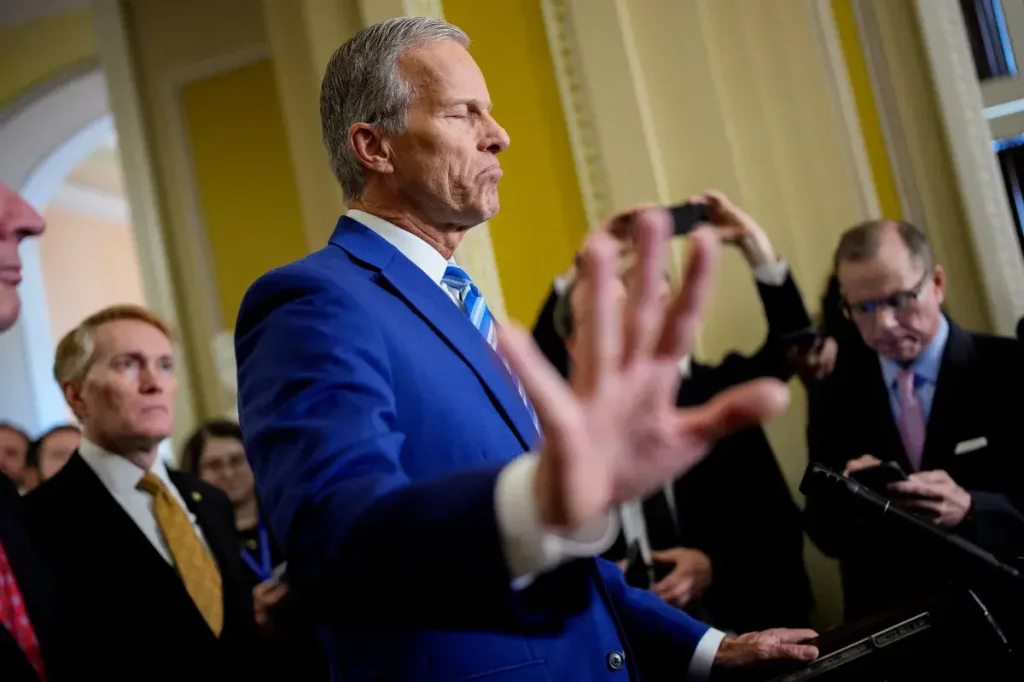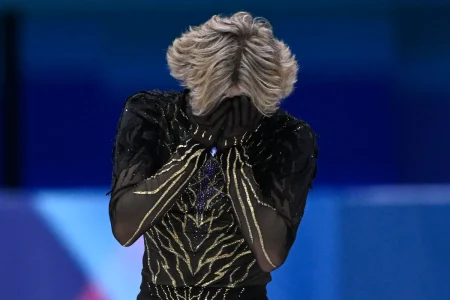Senate Republicans Withdraw Support for Trump’s Nominee Amid Controversy
In a significant political development, Senate Majority Leader John Thune announced on Monday that he hopes the White House will withdraw Paul Ingrassia’s nomination to lead the Office of Special Counsel. This statement follows Politico’s reporting on allegedly racist and antisemitic text messages exchanged between Ingrassia and Republican operatives. “He’s not gonna pass,” Thune bluntly told reporters, signaling a rare instance of Republican resistance to a Trump administration nominee. At least three other Senate Republicans have also publicly declared their opposition: Rick Scott of Florida, Ron Johnson of Wisconsin, and James Lankford of Oklahoma. Despite the mounting opposition, Ingrassia, who currently serves as White House liaison to the Department of Homeland Security, remains scheduled to testify Thursday before the Senate Homeland Security and Governmental Affairs Committee.
The swift Republican defection represents a remarkable fracture within GOP ranks, creating a nearly insurmountable mathematical challenge for the 30-year-old nominee. Under Senate rules, Ingrassia can lose only three Republican votes before requiring Vice President JD Vance to cast a tiebreaker, assuming unanimous Democratic opposition. With four Republicans now signaling opposition or skepticism, the nomination appears effectively doomed. Republican senators have expressed concerns about Ingrassia’s background, experience, and alleged antisemitism since July, when one senator delayed his nomination hearing citing concerns about hostility toward Jews. Senator Scott made his position clear in a July interview with Politico, stating, “This big thing for our state is, he’s had some statements about antisemitism.” The controversy comes at a particularly sensitive time, just one week after several Young Republicans were implicated in a separate scandal involving racist, antisemitic, and misogynistic comments in leaked chat messages.
According to Politico’s Monday report, the leaked text messages show Ingrassia stating that the Martin Luther King Jr. holiday should be “tossed into the seventh circle of hell” and claiming he has “a Nazi streak.” Edward Andrew Paltzik, Ingrassia’s attorney, neither confirmed nor denied the authenticity of the texts, instead suggesting they “could be manipulated or are being provided with material context omitted.” The controversy surrounding Ingrassia doesn’t end with these text messages. Earlier this month, Politico separately reported that he had been investigated over a sexual harassment allegation involving a lower-ranking colleague who filed a complaint before later retracting it. Scott, Johnson, and Lankford—all members of the Senate Homeland committee—will have an opportunity to question Ingrassia on Thursday if his confirmation hearing proceeds as scheduled.
Republican Senator Rand Paul of Kentucky, who chairs the Senate Homeland panel, has taken a more measured approach, referring questions about Ingrassia’s future to the White House while confirming that the nominee remained on the witness list as of Monday evening. Paul told Semafor, “They have to decide if he can go through. I’ve told them to count the votes… the White House needs to make a decision. I’m leaving it up to them.” This stance places the burden of deciding whether to withdraw the nomination squarely on the Trump administration rather than the committee. Meanwhile, Senators Scott and Lankford made their positions unmistakably clear to reporters on Monday, with Scott saying, “I’m not supporting him. I can’t imagine how anybody can be antisemitic in this country. It’s wrong,” and Lankford adding, “I have tons of questions for him,” before stating he “can’t imagine supporting that.”
Ingrassia’s attorney has attempted to provide context for the controversial messages, suggesting they were meant as “self-deprecating and satirical humor making fun of the fact that liberals outlandishly and routinely call MAGA supporters ‘Nazis.'” Paltzik further defended his client by claiming, “Mr. Ingrassia has incredible support from the Jewish community because Jews know that Mr. Ingrassia is the furthest thing from a Nazi.” The attorney also raised questions about the authenticity of the messages themselves, stating, “In this age of AI, authentication of allegedly leaked messages, which could be outright falsehoods, doctored, or manipulated, or lacking critical context, is extremely difficult.” This defense strategy attempts to reframe the controversy as potentially manufactured or misconstrued rather than addressing the substance of the statements attributed to Ingrassia.
As Thursday’s confirmation hearing approaches, Ingrassia faces an increasingly narrow path to confirmation. He will likely face intense questioning about the text messages and the allegations of antisemitism and sexual harassment from committee members, including the Republican senators who have already publicly opposed his nomination. The White House has not yet responded to requests for comment on whether they intend to withdraw the nomination in light of the mounting Republican opposition. This situation represents a rare instance where President Trump’s personnel choices have met significant resistance from within his own party, highlighting how controversial statements related to race and religion remain potent flashpoints even among Republicans who typically align with the administration. Whether Ingrassia proceeds to his confirmation hearing or the White House chooses to withdraw his nomination beforehand, the episode underscores the challenges of the confirmation process and the limits of party loyalty when nominees bring significant personal controversies.














